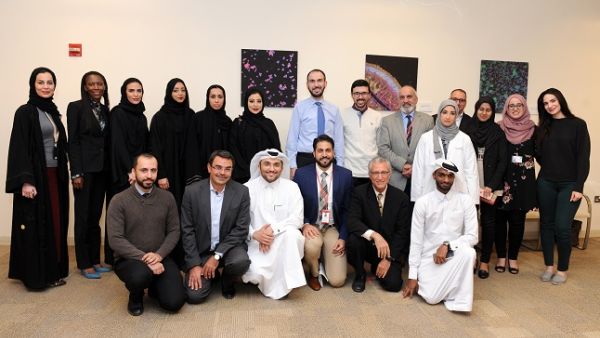Biomedical Research Opportunities Abound for WCM-Q Alumni

The multitude of opportunities for alumni of Weill Cornell Medicine – Qatar (WCM-Q) to engage in biomedical research were outlined by some of the country’s leading researchers at a recent symposium.
Recent graduates of the college, many of whom are working as doctors at Hamad Medical Corporation (HMC) and Sidra Medicine, were invited to the WCM-Q 1st Research Opportunities Symposium to learn more about the ways they could become physician scientists – doctors who practice medicine but also undertake research to increase the canon of medical knowledge. This also allows doctors to work on areas of special interest to them and, if their work is significant, to gain an international reputation and enhance their careers.
Dr. Robert Crone, vice dean for clinical & faculty affairs and professor of clinical pediatrics at WCM-Q, said: “Thanks to very considerable investment and visionary leadership in recent years, Qatar now has the state-of-the-art facilities and talented professionals required to conduct biomedical research at the highest level. Our message to WCM-Q alumni is simple: take advantage of these unique circumstances and engage yourself in research that will further your own career and - most importantly – help to improve the health of patients in Qatar and the wider world.”
WCM-Q graduate doctors who attended the symposium heard from Dr. Ibrahim Janahi, the executive director of medical research at HMC, who told them that research is one of the three pillars of the organization - along with healthcare and education – and that it is vital to HMC’s role as an academic health system. Dr. Janahi underlined the importance of research in driving change in clinical practices and improving outcomes for patients. He also stressed the support that HMC offers physician doctors, both financially and logistically, to ensure their research is valid and meets the highest of international requirements.
Dr. Khaled Machaca, associate dean for research at WCM-Q, discussed the development of WCM-Q’s research program and the infrastructure that the college has at its disposal, including core laboratories in genomics, proteomics, microRNA, and bioinformatics, and metabolomics – the resources of which could be utilized for agreed research studies. He also spoke of the impact that WCM-Q research is having, with almost 16,000 citations in scholarly works since the biomedical research program was launched in 2009, achievements that are placing Qatar firmly on the scientific world map.
Dr. Machaca said: “Thanks to the importance that Qatar’s leadership places on research and its investment – through Qatar National Research Fund (QNRF) – in the creation of knowledge, Qatar has become a regional scientific hub, and attracts collaborations with highly prestigious institutions and established research programs across the world.
“By undertaking research in Qatar, WCM-Q’s graduate doctors add to the body of biomedical knowledge, help achieve the aims of Qatar National Vision 2030, and also potentially make a hugely positive impact on the lives of their patients.”
The criteria required for QNRF funding and how to apply for it formed the basis of Dr. Laith Abu-Raddad’s presentation. WCM-Q’s assistant dean for extramural research funding gave an overview of QNRF’s funding programs and outlined the focus of QNRF’s National Priorities Research Program. This includes cancers, genetic diseases, epidemiology studies, alongside diabetes, obesity, hypertension, and cardiovascular complications.
Dr. Abu-Raddad also spoke about the “path towards personalized medicine”, and the support of research that aims to provide tailored medical treatment based on genetic profile. Finally, WCM-Q’s alumni heard from Yassir Hussein, WCM-Q’s assistant director of research training and outreach, who oversees the college’s Biomedical Research Training Program for Nationals that introduces graduates to biomedical research and aims to build human research capacity in line with Qatar National Vision 2030. In addition, Ms. Haya Haj Ahmad, alumni affairs manager at WCM-Q, said that the college has a network of staff able to support and facilitate alumni who wish to take advantage of the many research opportunities on offer.
One of the alumni who attended the symposium was Dr. Sara Al Khawaga, who obtained her medical degree with several honors from Weill Cornell Medicine-Qatar in 2014. After completing her residency at Hamad Medical Corporation, she completed a PhD in biological and biomedical science while concurrently completing a fellowship focusing on pathways governing stem cell-derived pancreatic beta cells.
Now working at Sidra Medicine’s Clinical Research Center on translational research, Dr. Al-Khawaga is already experienced in biomedical research, including having worked with Dr. Manikkam Suthanthiran in the Department of Transplantation Immunology at Weill Cornell Medicine - New York. She is currently researching neonatal diabetes, familial and rare forms of diabetes in children, with reference to molecular mechanisms. Dr. Al-Khawaga explained that the symposium had been a useful reminder of the available facilities, saying: “It was very helpful to re-connect with Weill Cornell's scientific community for potential collaboration. Further, it was helpful to get to know more about the different core facilities at Cornell for future collaboration and to avoid redundancy in infrastructure.”
Background Information
Weill Cornell Medical College in Qatar
Weill Cornell Medicine - Qatar is a partnership between Cornell University and Qatar Foundation. It offers a comprehensive six-year medical program leading to the Cornell University M.D. degree with teaching by Cornell and Weill Cornell faculty and by physicians at Hamad Medical Corporation (HMC), Aspetar Orthopedic and Sports Medicine Hospital, the Primary Health Care Corporation, the Feto Maternal Center, and Sidra Medicine, who hold Weill Cornell appointments. Through its biomedical research program, WCM-Q is building a sustainable research community in Qatar while advancing basic science and clinical research. Through its medical college, WCM-Q seeks to provide the finest education possible for medical students, to improve health care both now and for future generations, and to provide high quality health care to the Qatari population.






